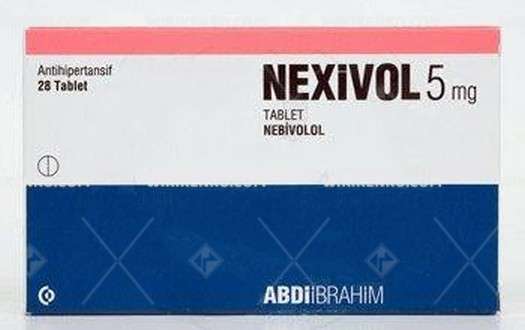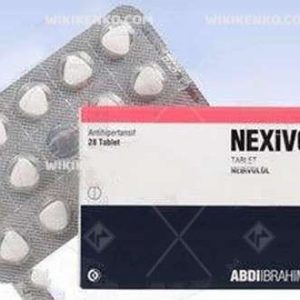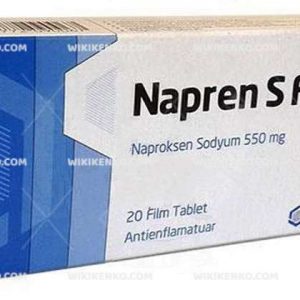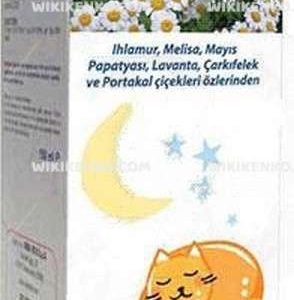Nexivol Tablet 5 Mg
In the realm of pharmaceutical solutions, Nexivol emerges as a trusted ally in the battle against high blood pressure (hypertension) and heart failure in elderly patients. Let’s delve into this medication’s essential details, from its composition to usage and precautions.
| Dosage form | |
|---|---|
| Pack size | |
| Potency | 5 Mg |
| Manufacturer | |
| Origin | |
| Generic Name (Ingredient) | Nebivolol Hydrochloride (Equivalent To 5 Mg Nebivolol) 5.45 Mg |
Assuming your emergency circumstances for this product, visit Urgent Quotation page. Besides, for any pharmaceutical questions, please ask us in the comments section.
Description
Composition
At its core, Nexivol contains the active ingredient nebivolol hydrochloride. Each Nexivol tablet is a reservoir of 5 mg of nebivolol, equivalent to 5.45 mg of nebivolol hydrochloride. Alongside this active component, Nexivol tablets feature a blend of inactive ingredients, including lactose monohydrate (derived from cow’s milk), starch, microcrystalline cellulose type 101, croscarmellose sodium, hydroxypropylmethyl cellulose E5, polysorbate 80, colloidal silicon dioxide 200, and magnesium stearate. This precise combination works synergistically to deliver the desired therapeutic effects.
Indications
Nexivol boasts a multifaceted approach to medical care. It is primarily indicated for two key purposes:
- Hypertension Management: Nexivol effectively tackles high blood pressure, providing individuals with a reliable means of keeping this condition in check.
- Heart Failure Support: In stable mild to moderate heart failure cases involving patients aged over 70 years, Nexivol serves as an adjunctive treatment. Its active ingredient, nebivolol, belongs to the selective beta-blockers group, known for their specific cardiovascular system impact. Nebivolol’s mechanism involves preventing an undue increase in heart rate while regulating the heart’s pumping power. Additionally, it boasts vasodilatory properties, contributing to blood pressure reduction.
Dosage
Proper dosage is pivotal for Nexivol’s efficacy. For adults, including the elderly, and individuals aged 12 years and older, the recommended starting dose is 5 mg taken once daily. This dose can be adjusted as needed, but it should not exceed 40 mg per day. For patients with severe renal impairment, the initial dose should be 2.5 mg taken once daily, with the possibility of gradual titration if required.
Precautions
Before embarking on Nexivol usage, certain precautions must be acknowledged:
- Allergies and Medical Conditions: Patients should inform their healthcare providers about any allergies or underlying medical conditions. Nexivol should be avoided if there is an allergy to nebivolol or any of its components.
- Contraindications: Nexivol is not suitable for individuals with specific medical conditions such as low blood pressure, severe circulation problems in the arms or legs, very low heart rate (less than 60 beats per minute), certain serious heart rhythm disorders (like second- or third-degree atrioventricular block or heart conduction disorders), newly developed or recently worsened heart failure, or those receiving intravenous medication to support the heart due to circulatory shock caused by acute heart failure.
Side Effects
As with any medication, Nexivol may entail certain side effects. Common occurrences include dizziness, fatigue, nausea, and headaches. It’s essential to note that these side effects are relatively common and may not affect everyone. However, in the event of any side effects, consulting a healthcare provider is imperative. Additionally, serious side effects, such as heart failure and bronchospasm, have been reported. Timely communication with a medical professional is crucial to address such concerns effectively.
Onset of Action
Nexivol’s onset of action can vary from person to person and is influenced by factors such as age, weight, and overall health. According to sources, Nexivol has a Tmax (time to reach maximum concentration in the blood) of 1.5-4 hours. This indicates that it may take between 1.5 and 4 hours for the medication to reach its peak effect within the body. Patients are encouraged to consult their healthcare providers if they have any questions or concerns regarding its onset of action for their specific circumstances.
Cocnlusion
In conclusion, Nexivol is a pharmaceutical asset carefully designed to address hypertension and offer support in stable mild to moderate heart failure cases in elderly patients. With a clear understanding of its composition, dosage, precautions, and potential side effects, individuals can harness it as a potent tool in their journey toward improved cardiovascular health. As always, adherence to prescribed regimens and open communication with healthcare providers remain essential pillars of effective medical management.
Use the form below to report an error
Please answer the questions as thoroughly and accurately as possible. Your answers will help us better understand what kind of mistakes happen, why and where they happen, and in the end the purpose is to build a better archive to guide researchers and professionals around the world.
The information on this page is not intended to be a substitute for professional medical advice, diagnosis, or treatment. always seek the advice for your physician or another qualified health provider with any questions you may have regarding a medical condition. Always remember to
- Ask your own doctor for medical advice.
- Names, brands, and dosage may differ between countries.
- When not feeling well, or experiencing side effects always contact your own doctor.
Cyberchondria
The truth is that when we’re sick, or worried about getting sick, the internet won’t help.
According to Wikipedia, cyberchondria is a mental disorder consisting in the desire to independently make a diagnosis based on the symptoms of diseases described on Internet sites.
Why you can't look for symptoms on the Internet
If diagnoses could be made simply from a textbook or an article on a website, we would all be doctors and treat ourselves. Nothing can replace the experience and knowledge of specially trained people. As in any field, in medicine there are unscrupulous specialists, differences of opinion, inaccurate diagnoses and incorrect test results.






Reviews
There are no reviews yet.